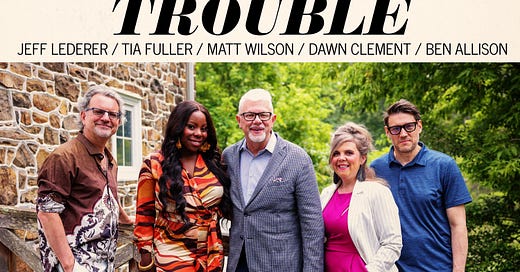Trouble in Mind
In the midst of an election year, jazz drummer Matt Wilson aims for uplift. His new album conjures the legacies of John Lewis, RBG, and Ornette Coleman.
Matt Wilson - Good Trouble
Affable jazz drummer Matt Wilson has a new album and a new quintet, both of them called Good Trouble— and if you’re a student of American history, you probably already know the origins of that name. It was a favorite phrase of the late John Lewis, the heroic Congressman and Civil Rights icon who advocated for peaceful demonstration and active community engagement. These ideals set the tone for Wilson’s new record, a cheerful yet unflinching call to action in the midst of an already-fraught election year.
For a sense of where his political and musical sensibilities stand, consider “RBG,” an ebullient tribute to the late Supreme Court Justice. The track is a vibrant amalgam of bright gospel energy with a cheerful Caribbean beat, featuring raucous playing from the horn section and cavernous thumps from Wilson’s drum kit. Though mostly instrumental, the song culminates in a gleeful group chant: “Ruth Bader Ginsburg! Ruth Bader Ginsburg! Honor her plea! Serve your community!”
Maybe this sound hokey, and maybe it sounds like a significant oversimplication of Ginsburg’s life and legacy— but such earnestness is a key to Wilson’s appeal. At 59, the drummer has made a career on combining prodigious musical talent (including some fairly outre compositions) with good-natured vibes and well-honed dad jokes; consider Matt Wilson’s Christmas Tree-o, an essential holiday release performed by a wild and woolly three-piece. Good Trouble aims for uplift in an era of sour, rancorous politics— and through its musical vitality and all-in commitment to Obama-era optimism, it functions as an effective inoculant to some of 2024’s ambient anxiety.
“RBG” is just one of several songs meant to honor a spirit of political activism, including a suite of songs dedicated to Lewis. At the center is “Good Trouble,” an exercise in high-stepping, rafter-raising gospel-jazz— think Charles Mingus if he had been less dyspeptic. The song builds to a rousing conclusion, powered by the moaning horns and by what critic Nate Chinen calls Wilson’s amiable spang-a-lang.
Political icons aren’t the only spirits Wilson summons here. His suite for Lewis leads directly into Ornette Coleman’s “Feet Music,” a boisterous block party that’s driven by Ben Allison’s propulsive bass. It’s an irresistible burst of kinetic energy, and it exemplifies the “happy warrior” posture of Wilson’s music— this is an album that counters political anxiety with a spirit of joyful activity. The commentator Simon Rosenburg often says, do more, worry less, and Good Trouble is intentional about channeling political jitters into forward motion.
Throughout the record, that motion largely takes the form of good-old-fashioned swing. Working with a band that also includes alto saxophonist Tia Fuller, tenor saxophonist/clarinetist Jeff Lederer and pianist/vocalist Dawn Clements, Wilson turns in a timeless set of songs informed by the bop, blues, and gospel traditions, the performances crackling with tunefulness and energy. A review in DownBeat notes that Wilson sounds “as boisterous and hard-swinging as ever.”
The vim and vigor of this band is evident from the get-go. The album opens with “Fireplace,” a set of knotty riffs and spirited solos offered in tribute to the late pianist Geri Allen. It’s followed immediately by “Albert’s Ally,” a slinky, smokey blues. There are gentler moments, too, many of them featuring the agreeable vocal work of Clements— most notably an easeful reading of the John Denver tune “Sunshine on My Shoulders.”
Wilson has a rich catalog of records that combine his musical virtuosity with a positive spirit— previous album titles include Smile and Hug! That amenable spirit has never felt as focused and intentional as it does here, nor have his gifts as a bandleader been more apparent. It adds up to one of the best old-school jazz records in recent memory— and a welcome counterbalance to the acrimony and cynicism that pervade so much political chatter.
My rating: 8 out of 10.
Meshell Ndegeocello - No More Water: The Gospel of James Baldwin
While Matt Wilson honors the legacies of John Lewis and RBG, the prodigious bassist Meshell Ndegeocello has a new album honoring James Baldwin, the iconic writer and thinker, on the occasion of his centennial.
No More Water: The Gospel of James Baldwin captures some of the loose, exploratory spirit of last year’s terrific The Omnichord Real Book. Using Baldwin’s words as a narrative through-line, this album feels more focused than its predecessor; with the bulk of its songs documenting the harrowing nature of Black struggle, it’s also an album that’s less easy to play casually.
I wrote a quick take for Flood Magazine:
Joining the Blue Note label has clearly galvanized Ndegeocello toward a borderless approach to music-making. Where previous albums have flitted between different disciplines and idioms, her more recent work is proudly sprawling and cross-pollinated. Like its predecessor, No More Water is stacked with collaborators from the jazz world, but veers often and easily into speaker-rattling funk and psychedelic soul. Driven by a droning organ refrain, opener “Travel” is informed by grooving dubstep, while “Pride I” borrows its unrelenting rhyme from Fela Kuti. At the other end of the spectrum is the spacy “What Did I Do?,” which adapts a Fats Waller anthem into something slow, bruised, and bluesy.
Befitting an album-long tribute to Baldwin, No More Water is an egoless celebration of community; it’s not until the fifth song, a folksy reprieve called “The Price of the Ticket,” that you clearly hear Ndegeocello at the microphone. Much of the heavy lifting here is done by guest singers and players, foremost among them the Jamaican poet Staceyann Chin and Pulitzer-winning author Hilton Als, whose spoken-word meditations reflect Baldwin’s own political and intellectual rigor. The words here are as important as the music, and often they’re nearly as striking as Baldwin’s: Over the course of five minutes, “Raise the Roof” imagines the kind of clarity and conviction the writer might have brought to the long tail of state-sanctioned violence against Black people, up to and including Eric Garner, Michael Brown, and Trayvon Martin.
You can read the rest over at the FLOOD website.
My rating: 7.5 out of 10.
More jazz!






